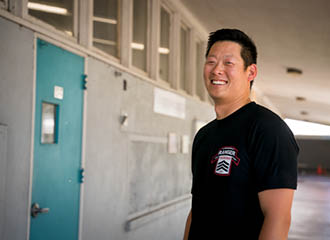When These Veterans Needed Answers, Therapy Helped Give Them
2-minute read
When These Veterans Needed Answers, Therapy Helped Give Them
2-minute read
Identifying mental health challenges or the source of these challenges can be difficult to do on your own. Aspects of your personality may have changed during or after your military service, affecting your relationships or quality of life, but it’s not always easy to trace the root cause. Perhaps you are frustrated that you have not been able to address challenges despite good-faith efforts.
Counseling and therapy can help you manage these difficulties. For these four Army Veterans, the decision to seek support was the key to identifying the source of their challenge, finding treatments and techniques that worked for them, and unlocking their full potential:

“I wasn't ready.” Army Veteran Discusses PTSD and Being Open to Healing
- “I always felt like something was wrong, but I didn’t know what was wrong,” Courtney says. The former Army cook, electronic maintenance technician and recruiter says therapy helped her deal with the mental health consequences of the military sexual trauma she had blocked from her memory. One-on-one counseling, group therapy and ketamine treatment helped put her on the right track.
- “You’re not going to be able to heal from a particular issue unless you address it,” Dennis says. The former infantryman didn’t realize posttraumatic stress disorder (PTSD) was causing his anger and combativeness until his brother — also a Veteran — encouraged him to visit a Vet Center. Dennis says counseling and therapy helped him identify his PTSD and taught him how to manage his reactions when his emotions are heightened.
- “Therapy was the key because it helped me face the demons that I had been running from for so many years,” Joseph explains. The former combat engineer says dialectical behavioral therapy and other mental health techniques — along with frequent drug testing that held him accountable — helped him stay sober after many attempts to stop his substance misuse.
- “I’m 61. It took me about 56 years to love myself,” says Deidre, who served as a finance specialist from 1981 to 1984. Deidre says therapy is what allowed her to overcome maternal neglect, spousal abuse and feelings of worthlessness. “I had to just acknowledge who I was, who I wanted to be and fortunately who I’d always been but just hadn’t let it come out,” she adds. “The therapy — I couldn’t have done it without it.”
Dennis encourages other Veterans to be proactive about seeking help to identify and treat mental health challenges, noting that the military operates on the basis of mutual support.
“There is no way any Service member completed a mission by themselves; there was always support,” he says. “It’s not a negative thing to try to seek treatment to better yourself, to make yourself a better person.”
